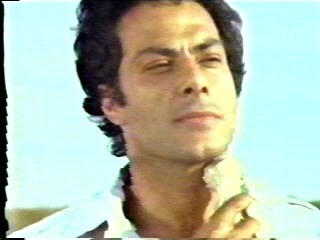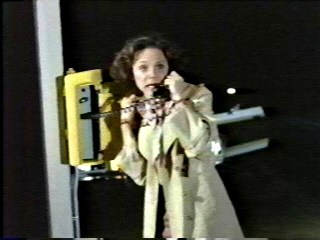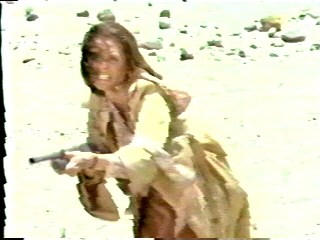
|
|
|
|
|
|
|
|
|
|
|
|
|
(1977) Director: E. W. Swackhamer The 1970s were considered the golden era for American theatrical films, but this was also the golden era for their smaller brethren, the American made-for-TV film. A dollar could still be stretched pretty far, so it was easier and more economical than now to make them. With the risks at a minimum and much less pressure, these particular made-for-TV movies managed to walk that fine line between cheapness and glossiness; as I mentioned in the past, they boasted decent production values without coming across in the bright and artificial way many made-for-TV movies today come across. Sometimes they looked good enough to be released in theaters overseas, such as KISS Meets The Phantom Of The Park. Also, the made-for-TV movies of that era were also able to bring more top talent in front of the screen. Some were theatrical stars like Glenn Ford (The Brotherhood Of The Bell) and Bing Crosby (Dr. Cook's Garden). Mostly, though, the stars were recruited from the world of television series. A common thing TV producers of a hit show would do to please their cast members would be to offer them roles in TV movie productions to be shot during the show's hiatus. This would be a win-win situation for everyone involved; the network televising the made-for-TV movie would have a star, the star would get some extra pocket money and a chance to present himself differently to the public (and reduce the chance of being typecast), and the producers of that star's TV show would indirectly get some extra publicity for their show. If you look at many of the top-rated shows in the 70s, you'll find that most of their stars used their time off at least once to make a made-for-TV movie. For example, despite his hectic schedule working on All
In The Family, Carroll O'Connor managed to appear in a couple of
made-for-TV movies during its run. Mike Farrell and Alan Alda found
time off In the meantime, us '70s made-for-TV movie lovers will do what we can to watch more of these movies - scanning the TV schedules, making regular visits to the local pawn shops to find more of those elusive copies, or relax and simply make arrangements with someone over the internet to get bootlegs of those made-for-TV movies we are looking for. That's what I had to do to get a copy of Night Terror, even though it did manage to get a video release in the late '80s, no doubt because star Valerie Harper had been making many headlines at the time because of her feud with the producers of Valerie (...uh, I mean Valerie's Family.... uh, I mean The Hogan Family.) She had made the movie the previous decade, during a break from her run on Rhoda, and the movie happened to be a change from the comic work she was known for at the time. Here she plays ordinary housewife Carol Turner, who at the beginning of the movie is completing the remaining things that need to be done with the moving of her family from Phoenix to Denver. The kids are sent ahead to be with their aunt, and Carol and her husband (Tolan) plan to make the upcoming drive a second honeymoon of sorts. While her husband is away on some late last-minute business at the office, she gets word on the phone that her son has been hospitalized for some ailment. Unable to contact her husband, she decides to leave a note and drive through the night straight to Denver, since the Denver airport is snowed in. Along the way, noticing she needs gas, she decides to get directions from a highway patrolman who has just stopped a speeding motorist (Romanus, The Sopranos) - just as the motorist sticks a shotgun out his window and promptly blasts the patrolman right across Carol's hood. Carol speeds away - but not before the crazed man has shone a light on her face that gives him a good look at her. What follows, as you've probably correctly guessed, is
another variation of that premise of an ordinary person being pursued
by a deadly threat in an isolated area that No, Carol is never seen making MacGyver-like booby-traps or enacting equally complex schemes during the long night. Rather, she more often than not (wait for it!) does the same thing we are thinking we would personally do in the same predicament! When she gets stuck in the mud at one point, she puts the floor mats of the car under the tires. When that doesn't work, she dumps open a suitcase and puts all the clothing under the tires - more important to dirty and lose some clothes than your life, as any sane person would agree. The episode at the closed gas station is another excellent example. Break in to use the telephone... but what if it doesn't work? Well, get some gas so you can flee the area... but how to get to the locked pumps? Think: what would you do next? Are you sure you have thought of everything? The outcome of Carol's determination to get gas comes off as completely true, even with the mistake she finds she's made at one point - anyone could have forgotten that step, especially sharing her hurried circumstances. By the way, Carol's outcome in this and most other scenes also depends a little on luck, just like with real life struggles - sometimes she's fortunate to find something of assistance, but sometimes something unexpected comes up that decreases her chances of survival temporarily or even up to the very end of the conflict. I will say not every scene with Carol putting a plan into action works. For instance, there's an unbelievably dumb scene when she comes across a highway emergency phone, which could have easily brought things to a close quickly. But she suddenly loses her relatively sane way of thinking, and can only cry and blubber stuff like "He's trying to kill me!" to the bewildered operator, and can't even identify the number of the telephone she's calling from despite that the identification number is written on a large and brightly-lit sign on the same telephone post. But even weaker moments like these are partially
redeemed by Harper's performance. Not once did I think of Rhoda or her
other sitcom work while watching her; her speech and the thinking you
see going behind Television director veteran Swackhammer uses a number of simple yet effective techniques to keep up the unrelenting atmosphere. There's little background music, even in the more intense sequences, so there's less that we can hold on to and let us say confidently "It's only a movie." Keeping with this more true-to-life direction, he also lets many scenes play out in real time instead of editing them down to play more quicker. Seeing Carol struggle step-by-step with getting gas makes a feeling of unease grow with each second, because every second she must stay there means a greater chance the killer will drive around the corner before she's done and on the road again. Romanus' killer character, by the way, is really the seed that is behind all this terror I've been talking about, an especially vicious type. He is missing his voice box and seldom uses the electronic voice box he carries with him, so he's seen silently brooding most of the time, and you can only wonder what dark things are going on in his head. Several times out of frustration, he gargles unhuman and twisted noises out of his throat, creepy to listen to and portraying him even more like a mad animal. Yet, the movie still gives him some humanity. Early in the movie, the frustrating time he has with a coffee shop waitress suggests a great deal of self-loathing and pain about his condition. Plus, the movie decides to give him a fate much different than you might expect in movies of this kind, even though Carol had the opportunity. Come to think of it, the way it plays out is probably how it would do in real life for many of us, no matter what we might like to think. It's one of the ways that make Night Terror a pleasant change from what we usually see. Sure, it's often fun to see supermen give no quarter and pound the villains into oblivion, but it's nice once in a while to see a movie that lets us know we have the capability to survive, even if those supermen may beg to disagree. Check for availability on Amazon (VHS) See also: Dr. Cook's Garden, If I Die Before I Wake, Retroactive |
 M*A*S*H to each
appear in several TV movies. John Ritter may very well have been the
busiest, simultaneously managing to also squeeze in some theatrical
films while Three's Company was still on the air. Just about
every made-for-TV movie of the era had at least one recognizable star,
from TV series or other places. What's really strange is what has
happened to these movies after their original air dates. Despite the
notable people in their cast, these movies are all but impossible to
see today. Few of them were ever released on video, and it's even
pretty rare to see them broadcast on cable, even with the hundreds of
channels that are now available. When even something like
M*A*S*H to each
appear in several TV movies. John Ritter may very well have been the
busiest, simultaneously managing to also squeeze in some theatrical
films while Three's Company was still on the air. Just about
every made-for-TV movie of the era had at least one recognizable star,
from TV series or other places. What's really strange is what has
happened to these movies after their original air dates. Despite the
notable people in their cast, these movies are all but impossible to
see today. Few of them were ever released on video, and it's even
pretty rare to see them broadcast on cable, even with the hundreds of
channels that are now available. When even something like  has little, if
anything of assistance available for this protagonist - which wasn't
exactly new even when Duel premiered six years earlier.
While Night Terror certainly isn't up there with
Spielberg's take on the idea, it still remains one of the better
examples of the formula. First, the movie generates a great distance
towards its goal of working just from how it portrays its protagonist.
Yes, the screenplay contains some obvious things, like making her a
loving wife and mother to her family, but it actually doesn't embellish
its heroine much more than that. Rather, the movie is careful to make
and keep Carol more or less as an ordinary woman, not one who
eventually goes Rambo. She has her faults - the opening sequence of her
preparing the final stages of the move show she can be absent-minded at
times - but who isn't a little forgetful at times? But she definitely
has some strengths as well. Though the rest of the movie is more or
less her struggle for survival, she seldom breaks down and blubbers
along the way. Her panic mode makes her far too busy with keeping the
distance between herself and the killer for her to really think about
the bad things that may eventually happen. Carol proves herself to be
much smarter and braver than she may have thought - something the movie
seems to be suggesting about many other "ordinary" women out there.
has little, if
anything of assistance available for this protagonist - which wasn't
exactly new even when Duel premiered six years earlier.
While Night Terror certainly isn't up there with
Spielberg's take on the idea, it still remains one of the better
examples of the formula. First, the movie generates a great distance
towards its goal of working just from how it portrays its protagonist.
Yes, the screenplay contains some obvious things, like making her a
loving wife and mother to her family, but it actually doesn't embellish
its heroine much more than that. Rather, the movie is careful to make
and keep Carol more or less as an ordinary woman, not one who
eventually goes Rambo. She has her faults - the opening sequence of her
preparing the final stages of the move show she can be absent-minded at
times - but who isn't a little forgetful at times? But she definitely
has some strengths as well. Though the rest of the movie is more or
less her struggle for survival, she seldom breaks down and blubbers
along the way. Her panic mode makes her far too busy with keeping the
distance between herself and the killer for her to really think about
the bad things that may eventually happen. Carol proves herself to be
much smarter and braver than she may have thought - something the movie
seems to be suggesting about many other "ordinary" women out there. her eyes comes across like that of the ordinary housewife.
The role also provides some physically demanding tasks, and Harper
avoids being Superwoman in favor of doing these things as someone
knowing what has to be done, but has had no practice in this. It make
the action very believable, plus it makes for a great climatic sequence
when Carol can no longer think a few minutes ahead - she has to think
of now, each subsequent second for several minutes. What
follows is a desperate struggle, one where there is absolutely no hint
that Carol will or even could survive. We are forced mentally into the
this unrelenting battle, unprepared for anything that could happen, so
we are struggling along with her, and not level-minded and distant
enough from the action to scream things like, "Just hit him on the
head!" as we might say while watching another movie. The suddenness of
the finality of the battle hits us off guard, and the silent look of
the aftermath makes us realize just how prevalent luck - good or bad -
is in our existence.
her eyes comes across like that of the ordinary housewife.
The role also provides some physically demanding tasks, and Harper
avoids being Superwoman in favor of doing these things as someone
knowing what has to be done, but has had no practice in this. It make
the action very believable, plus it makes for a great climatic sequence
when Carol can no longer think a few minutes ahead - she has to think
of now, each subsequent second for several minutes. What
follows is a desperate struggle, one where there is absolutely no hint
that Carol will or even could survive. We are forced mentally into the
this unrelenting battle, unprepared for anything that could happen, so
we are struggling along with her, and not level-minded and distant
enough from the action to scream things like, "Just hit him on the
head!" as we might say while watching another movie. The suddenness of
the finality of the battle hits us off guard, and the silent look of
the aftermath makes us realize just how prevalent luck - good or bad -
is in our existence.